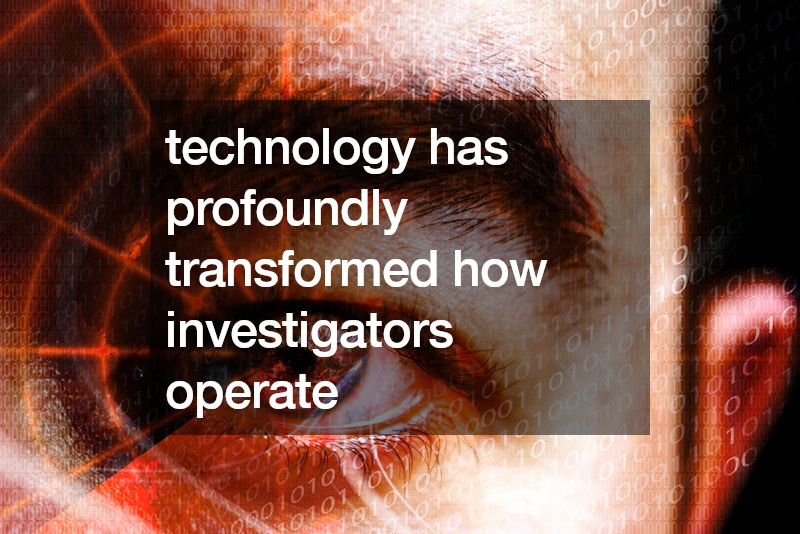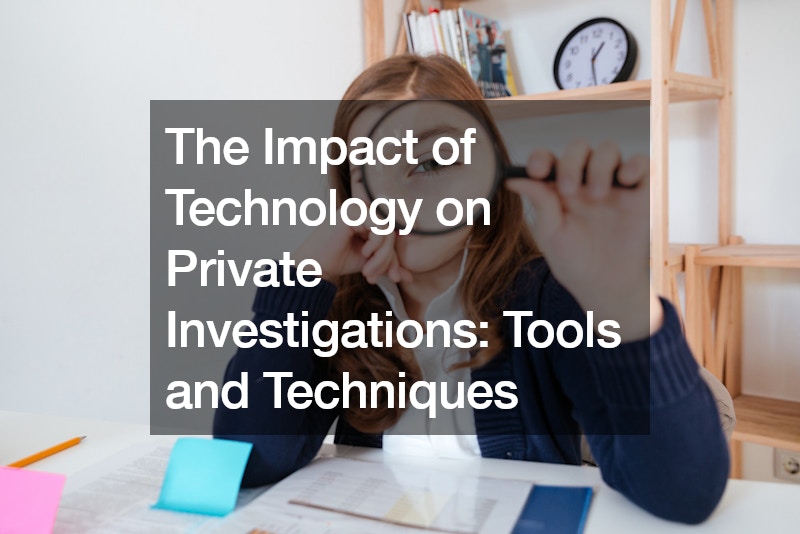In the realm of private investigations, technology has profoundly transformed how investigators operate, enhancing their capabilities and efficiency. From traditional surveillance methods to advanced digital forensics, the tools and techniques employed by private investigators today are vastly different from those used a few decades ago. This article delves into the significant impact of technology on private investigations, exploring the various tools and techniques that have become integral to the profession.
Evolution of Surveillance Methods
Surveillance has always been a cornerstone of private investigations. Historically, this involved physical observation and manual recording of activities. However, advancements in technology have revolutionized these methods, making surveillance more discreet and effective.
High-Resolution Cameras and Drones: Modern private investigators utilize high-resolution cameras capable of capturing clear images and videos from considerable distances. Additionally, drones equipped with cameras provide aerial surveillance, allowing investigators to monitor large areas without being detected. These tools are particularly useful in cases involving infidelity, insurance fraud, and missing persons.
GPS Tracking Devices: GPS technology enables private investigators to track the movements of subjects in real time. These devices can be discreetly attached to vehicles, providing continuous location data. This technology is invaluable in cases of suspected infidelity, employee misconduct, and locating missing persons.
Digital Forensics and Data Analysis
The digital age has brought about a surge in electronic evidence, necessitating the need for specialized skills in digital forensics. Private investigators now rely heavily on digital tools to uncover and analyze electronic data.
Computer and Mobile Forensics: Investigators use forensic software to extract data from computers, smartphones, and other digital devices. This process involves recovering deleted files, emails, messages, and browsing history. In cases involving cybercrime, divorce, or corporate investigations, digital forensics can uncover crucial evidence that might otherwise remain hidden.
Social Media and Online Investigations: Social media platforms are treasure troves of information. Private investigators use specialized tools to monitor and analyze social media activities, uncovering connections, communications, and behaviors relevant to their cases. Online investigations extend to forums, websites, and databases, providing a comprehensive view of the subject’s digital footprint.
Advanced Communication Monitoring
Modern communication methods have expanded the scope of investigations, allowing private investigators to gather information through advanced monitoring techniques.
Audio Surveillance and Bugging Devices: Audio surveillance devices, such as hidden microphones and bugging devices, enable investigators to listen in on conversations discreetly. These tools are used in various scenarios, including corporate espionage, infidelity cases, and internal investigations.
Phone and Email Monitoring: With appropriate legal permissions, private investigators can monitor phone calls and emails. This technique is essential in uncovering fraudulent activities, monitoring employee communications, and gathering evidence in legal disputes.
Cybersecurity and Ethical Considerations
While technology has undoubtedly enhanced the capabilities of private investigators, it also raises important ethical and legal considerations. The use of advanced surveillance tools and digital forensics must comply with privacy laws and regulations to protect the rights of individuals.
Compliance with Legal Standards: Private investigators must adhere to legal standards governing surveillance and data collection. Unauthorized access to digital devices or communications can lead to legal repercussions. Therefore, it is crucial for investigators to obtain proper authorization and follow due process.
Ethical Boundaries: The ethical use of technology in investigations is paramount. Private investigators must balance their pursuit of information with respect for privacy. This involves transparent communication with clients about the methods used and ensuring that investigations do not infringe on individuals’ rights.
The Future of Technology in Private Investigations
As technology continues to evolve, so too will the tools and techniques available to private investigators. Emerging technologies such as artificial intelligence (AI), machine learning, and big data analytics promise to further revolutionize the field.
AI and Machine Learning: AI and machine learning algorithms can analyze vast amounts of data quickly, identifying patterns and correlations that might elude human investigators. These technologies can enhance predictive analysis, risk assessment, and decision-making processes.
Big Data Analytics: The ability to process and analyze large datasets allows private investigators to uncover hidden connections and insights. Big data analytics can be applied to various types of investigations, including financial fraud, background checks, and criminal investigations.
Biometric Technologies: Biometric tools, such as facial recognition and fingerprint analysis, provide additional means of identifying and tracking subjects. These technologies are becoming increasingly integrated into surveillance and security systems.
Conclusion
The impact of technology on private investigations is profound, offering enhanced capabilities and new avenues for gathering evidence. From advanced surveillance tools to digital forensics and data analysis, private investigators have a wealth of resources at their disposal. However, the use of these technologies must be balanced with legal and ethical considerations to ensure investigations are conducted responsibly and lawfully. As technology continues to advance, private investigators will need to stay abreast of new developments, adapting their methods to maintain their effectiveness in an ever-evolving landscape.
.







